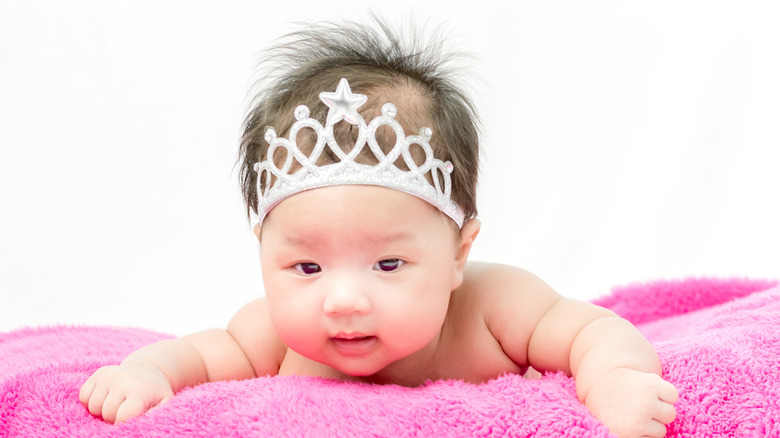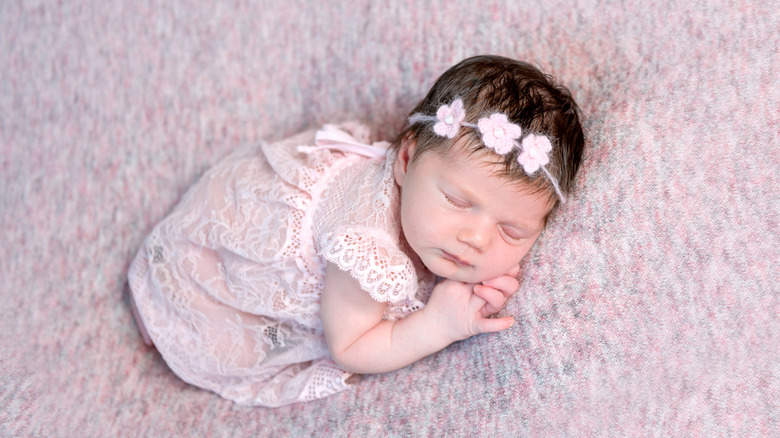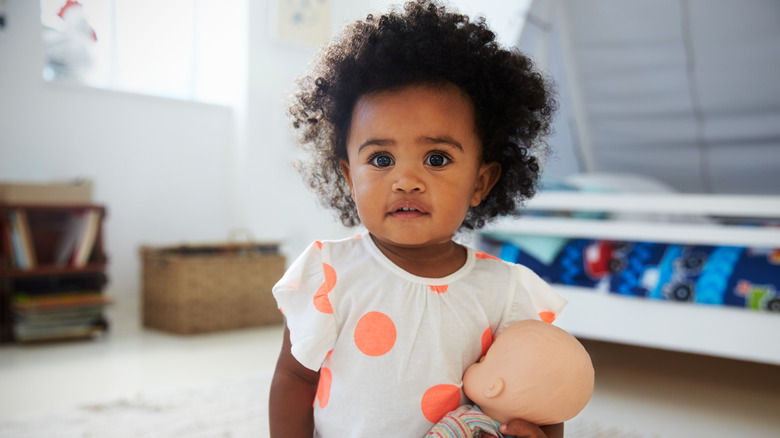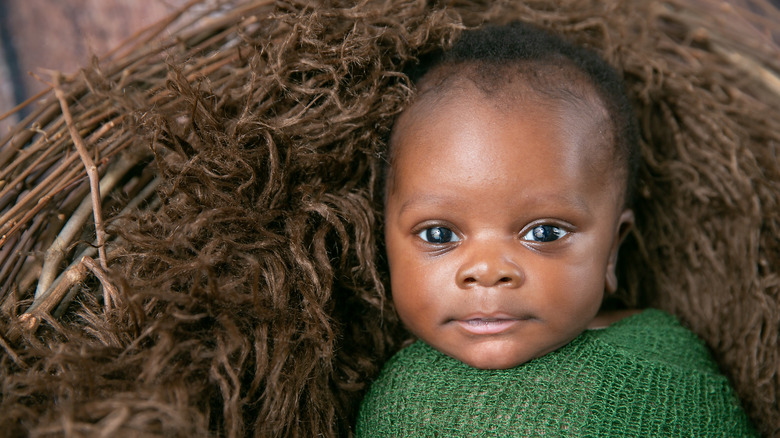Baby Names You Won't Regret In 10 Years
Let's face it: baby names are fickle. They go in and out of style so quickly that it can be hard to keep up with which names are trending and which ones are hopelessly out of date. What's an expectant parent to do? If you go with something new and modern for your little one, you run the risk of the name falling so far out of favor in a few years that you'll end up regretting your choice of baby name.
Picking a name for your little one is a tricky thing. While we can't be completely certain which names will be stylish in the next decade, we can pinpoint some tried and true names that have been beloved by parents for generations. These names have withstood the test of time and have entered the ranks of classic monikers. Keep reading for baby names that you definitely won't regret giving to your little one ten years from now.
Amelia
While similar in spelling and sound to Emilia, Amelia is actually a variation of the name Amalia. Its root word is "amal," which means "work," but you don't have to put in any effort at all to adore this lovely name. Amelia came to the attention of the English speaking world in the 18th century, and it has been going strong ever since.
The name has been on the rise in the United States in recent years, and entered the top 10 baby names for girls in 2017. This, combined with the fact that the name has never been off the list of top 1000 baby names since the Social Security Administration first started charting them in 1880, means that Amelia isn't going anywhere any time soon. There are also plenty of famous people to have borne the name, most notably Amelia Earhart who was the first woman to fly solo across the Atlantic Ocean.
Charles
The name Charles has quite the regal history. A favorite among rulers throughout the ages, the name's popularity with royals can be traced to Charles the Great, who is better known to us as Charlemagne. The historical figure was born in the 8th century, and united Western Europe after the fall of the Roman Empire. Charlemagne's impact was so great that translations of the name now mean "king" in several countries. In Russian, the term is "korol," in Turkish it is "kral," and in Czech it is "král." The name is still used for royals today, notably in the British royal family whose heir to the throne, Prince Charles, bears the name.
In spite of its powerful legacy, the name Charles is remarkably accessible — particularly because of its common nickname, Charlie, and its affiliation with loveable pop culture icons such as Charlie Chaplin, and the Peanuts character Charlie Brown. The name's long, imposing history has only been enhanced by such beloved characters which have helped to contribute to Charles' enduring popularity.
Elizabeth
Elizabeth is one of the most cherished and iconic names of all time. Dating back to the Bible, Elizabeth comes from the Hebrew name Elisheva which means "my God is an oath." The name has several wonderful nicknames, from the short and sweet Liz, to the more complex Lizzie, Eliza, Lilliana, Betty, and Lilibeth. This name, along with many of its forms in other languages, has been popular all over the world for centuries.
Elizabeth has long dominated the American charts – it has never fallen out of the top 30 names for girls, and has even seen sporadic use as a name for boys. It has also seen wide use in other English-speaking countries, as well as Chile, France, the Netherlands, Mexico, and the Czech Republic. It has been the name of many royals, including two of the most famous monarchs in history: Britain's Elizabeth I and Elizabeth II. With so many Elizabeths over the years, your baby will be in good company.
Edward
Long before Edward Cullen became the daydream of Twilight fans, Edward was a beloved English name with ancient roots. Edward comes from the Old English words "ead," meaning "wealth," and "weard," meaning "guard." It was borne by many kings throughout history and became so popular around the world that it has many variations in more than two dozen languages. International forms of Edward include the Spanish Eduardo, Swedish Edvard, Hawaiian Ekewaka, and Italian Edoardo.
One of the most endearing aspects of the name is its versatility. Edward comes with several adorable nicknames, including Ed, Eddy, Ned, and Teddy. Its abundance of variations, combined with its long and royal history, have made it a favorite with English-speaking parents for centuries. While primarily a masculine name, it was also given to girls in the United States in the early 20th century, albeit with far less frequency than for baby boys.
Julia
Julia's prolific history dates back to ancient times. It is the feminine form of the name Julius, a powerful family name of which we all know the influential Roman dictator Julius Caesar. Julia has been around for a long time, but it took a while for it to become common in the English-speaking world. Shakespeare used it for a character in his play The Two Gentlemen of Verona in 1594, but the name didn't really catch on until the 18th century.
Since then, Julia has been going strong, not just in the English-speaking world but also in several European countries. Historically a feminine name, many American parents also gave it to their baby boys in the late 19th and early 20th centuries. The name has been in the top 100 list for girls since 1980, making it a safe bet to put at the top of your list of potential baby names.
Andrew
How could you ever go wrong with name Andrew? Derived from the Greek word "andreios," meaning "manly," the name lends itself well to nicknames, such as Andy, Andre, and Drew, and it is also a time-honored classic. Andrew is such a beloved moniker that in 1881 and from 1982 to 1988 it even made the baby name lists for girls. While it didn't catch on enough to cross into officially being declared as a gender neutral name, Andrew's steam is far from running out among little boys around the world.
Since the Social Security Administration started tracking the popularity of baby names back in 1880, Andrew has never been out of the top 100 names for boys. Its long history dates back to Biblical times, and the name was exceptionally popular in the Middle Ages. Andrew is a favorite in several English-speaking countries, but its popularity doesn't end there; Andrew is also a beloved baby name in France.
Anna
With Anna Kendrick ruling the silver screen for the foreseeable future, it's highly unlikely that this treasured name will be falling off of top baby name charts this century, let alone within the next ten years. This traditional name has been beloved throughout history, and it can be ultimately traced back to the Hebrew name Channah, which can be found in the Bible. While far from the only incarnation of the moniker (other forms include Aina, Annabella, and Anissa), Anna is one of the most common throughout the English-speaking world, and also makes the charts in many other European countries.
Anna has long been a top 100 girls name in the United States and, like many other wildly fashionable names, has also seen significant use as a masculine name — although this largely died out in the U.S. in the early 20th century. This classic feminine name will endure for years to come.
William
Prince William isn't the only royal to have borne this name throughout history. William has long been a mainstay among European royals and nobles, including William the Conqueror, England's first Norman king. The name was also borne by several saints, but the most famous bearer of the name is probably playwright William Shakespeare who, more than 400 years after his death, is still regarded as one of the most influential writers in history.
The name William comes from a Germanic name, Willahelm, which comes from the words "wil," meaning "desire" or "will," and "helm," which means "helmet," or "protection." It has been in the top ten names for boys in the U.S. for several years, and was also on the name charts for girls for decades before falling off the list in 1988. With centuries of history under its belt, the name William is positively brimming with a long legacy that you can pass on to your little one with pride.
Margaret
This powerful name comes from the Latin name Margarita, which in turn comes from the Greek word "margarites," meaning "pearl," and may even be ultimately derived from the Sanskrit word "manyari." Margaret has been in use for well over a thousand years and was borne by many royals. From the root name Margaret, we get such diverse names and nicknames as Marjorie, Mamie, Peggy, and Madge. It is one of the most beloved and recognized feminine names in history, and can be found in various forms all over the world.
In the United States, Margaret is one of the most common names for baby girls. Particularly popular in the early 20th century (when it was also used for baby boys), Margaret has remained in the top 200 names for baby girls in modern times. Classic literary associations like Margaret Atwood (author of The Handmaid's Tale) and Margaret Mitchell (author of Gone With the Wind) add to its timeless allure, though if you still find it a little old-fashioned today, going with a more modern nickname like Meg or Maggie is a surefire solution to mix old and new.
Henry
You probably remember Henry from history class as the name of the English monarch who had more than one of his six wives executed, but the name's history isn't all bloody. Henry is just one version of the Germanic name Heimirich, meaning "home ruler." English versions of the name include Hank and Harry, both of which are also used as nicknames for Henry. In fact, Henry is the full name of the British royal more commonly known as Prince Harry.
With a royal pedigree and a noble meaning, it's no surprise that that this name has survived for so long. It fell out of the top 100 names for boys in the late 20th century, but even at its lowest ranking remained in the top 150. It has been back in the top 100 names since 2006, and has been rising in popularity ever since. Henry is one of those names that never really falls out of fashion, and is at the most popular it has been in decades, making it a sure pick for a name you won't regret a decade from now.
Olivia
We have the Bard himself to thank for the name Olivia. Shakespeare first used the name in 1602 in his play Twelfth Night, and it is thought that he likely based it on the already existing names of Oliver or Oliva. Considering the lasting legacy of Shakespeare's work, we can be sure that this is a name that will stick with us for many years to come. The playwright had a huge impact on the English language, and he coined many words that we still use today.
While the name's roots date back centuries, it didn't become very popular until the later half of the 20th century. It grew even more popular at the turn of the 21st century, and has been in the top ten names for girls since 2001. The name is also widespread in more than a dozen European countries, as well as being trendy in New Zealand and Chile.
Matthew
Like many other timeless names, Matthew has ancient roots and can trace its origins back to Hebrew by way of the Bible. It comes from the name Mattityahu, which means "gift of Yahweh." This English version of the name dates back to the Middle Ages and has been popular since then.
In the United States, the name saw a brief streak as a gender neutral name in the 1970s and 1980s. Its traditional use, however, was as a masculine moniker, and it remains most common as a name for boys today. Since 1956, it has steadily remained in the top 100 names for little boys. The name Matthew is also held dear in other English-speaking countries, and is also widely used in France. Other parts of the world use different versions of the name, including Mateo in Spanish-speaking countries, Makaio in Hawaii, Mattia in Italy, and Mats in Sweden.
Katherine
Historians aren't sure where the name Katherine originated, which only adds to its allure. It's thought that it comes from Greek, possibly from the names Aikaterine or Hekaterine. Another possibility is that it is derived from the name of the goddess Hecate. Its rise as a Christian name can likely be attributed to its association with the Greek word "katharos," which means "pure."
Whatever its origins, this name has been popular for centuries and is still going strong today. It has been widely used in England since the Middle Ages, with Catherine being another widely accepted spelling of the name. While both Katherine and Catherine are still beloved today, Katherine is the more commonly used spelling variation in the United States. The name is a bit long, but fortunately many adorable nicknames can be made out of it. If Katherine seems too long-winded for your little girl, try nicknaming her Kate, Katie, Kit, Kat, or Kathy.
Patrick
While many people often think of the name Patrick as an Irish name thanks to its association with the holiday of St. Patrick's Day, the moniker actually has Latin roots. It comes from the Latin Patricius, which means "nobleman." In fact, the legendary Patrick was not even Irish himself, but was actually a Brit who was enslaved by the Irish and who returned to Ireland as a missionary years after escaping from slavery and returning home.
The popularity of the saint and of the holiday is one reason that the name Patrick so adored today. It has been a common name in the United States for decades, where it consistently ranks in the top 200 baby names for boys. It is also, not surprisingly, one of the most popular names for boys in both Ireland and Northern Ireland. Patrick is also commonly used in other English-speaking countries, including New Zealand, Australia, England, and Wales. Whether you are paying homage to your Irish heritage or simply like it, Patrick is a name you'll be happy you chose ten years from now.
Sophia
Sophia isn't just one of the most popular names in the United States, but is also dominating charts all over the world — and for good reason. The name means "wisdom" in Greek, making it a favorite of generations of parents who hope to impart wisdom upon their daughters. Sophia is trendy in other English-speaking countries, as well as Austria, Belgium, Chile, France, Italy, the Netherlands, Norway, and Switzerland. Other variations of the name are also widely used, such as Sophie and Sofia.
While Sophia has a long history in the United States, the name really started to take off in the late 20th century when it began a slow but steady takeover of the charts. In 1997, the name entered the top 100 names for the first time, and was ranked number one from 2011 to 2013. It has dropped off a bit in the last few years, but still ranked in the top five names in 2017. Sophia will likely continue to top the charts for years to come
Samuel
Samuel comes from the Hebrew name Shemu'el, a name found in the Bible which means "God has heard" or "name of God." It didn't become popular until the 16th century when the Protestant Reformation ushered in a revival of Biblical names. It has been the name of several important figures in history, including inventor Samuel Morse who developed Morse code.
The name Samuel is one of the most widely used in American history. Since the beginning of the Social Security Administration records, the name has never fallen out of the top 100 baby names for boys. The name is also popular in more than a dozen European countries, and can also be found on baby name charts in Chile and Mexico. Its most common nickname, Sam, is so well loved that it is a given name in its own right, and also consistently makes the top baby name charts. Samuel's longevity makes it a prime pick for parents who don't want to look back on their baby name choice with regret.
















